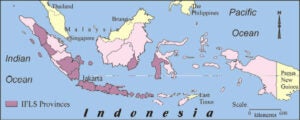The Indonesian Family Life Survey (IFLS) is an on-going longitudinal survey in Indonesia conducted by RAND and Survey METER. The IFLS is designed to provide data for studying behaviors and outcomes. The survey contains a wealth of information collected at the individual and household levels, including multiple indicators of economic and non-economic well-being.
In addition to individual- and household-level information, IFLS provides detailed information from the communities in which IFLS households are located and from the facilities that serve residents of those communities. These data cover aspects of the physical and social environment, infrastructure, employment opportunities, food prices, access to health and educational facilities, and the quality and prices of services available at those facilities
| Sample Sizes and Completion Rates | |
| IFLS1 1993 (Baseline) | Fielded between September 1993 and February 1994
7,200 households, 16,300 individual interviews |
| IFLS2 1997 | Fielded between August 1915%; and December 1915%;
7,500 households, 25,000 individual interviews 94% completion rate of living IFLS1 households |
| IFLS3 2000 | Fielded between June 2000 and October 2000
10,400 households, 31,000 individual interviews 95% completion rate of living IFLS1,2 and 2+households 95.3 completion rate of original IFLS households |
| IFLS4 2007 | Fielded between November 2007 and April 2008
13,500 households, 43,500 individual interviews 91.5% completion of living IFLS1, 2, 2+, and 3 households 93.6% completion of original IFLS households IFLS East 2012, Fielded in East Kalimantan, East Nusa Tengarra, Maluccu, Papua, Southeast Sulawesi and West Papua. Data are public on Survey Meter website IFLS5 2014-2015 Fielded in 2014-15. 16,204 households and 50,148 individuals. Household re-contact rate over 90% Website (data and documentation available) |
